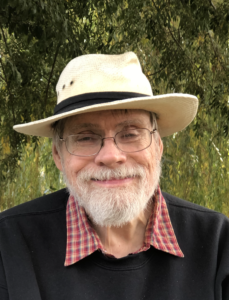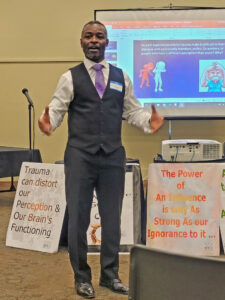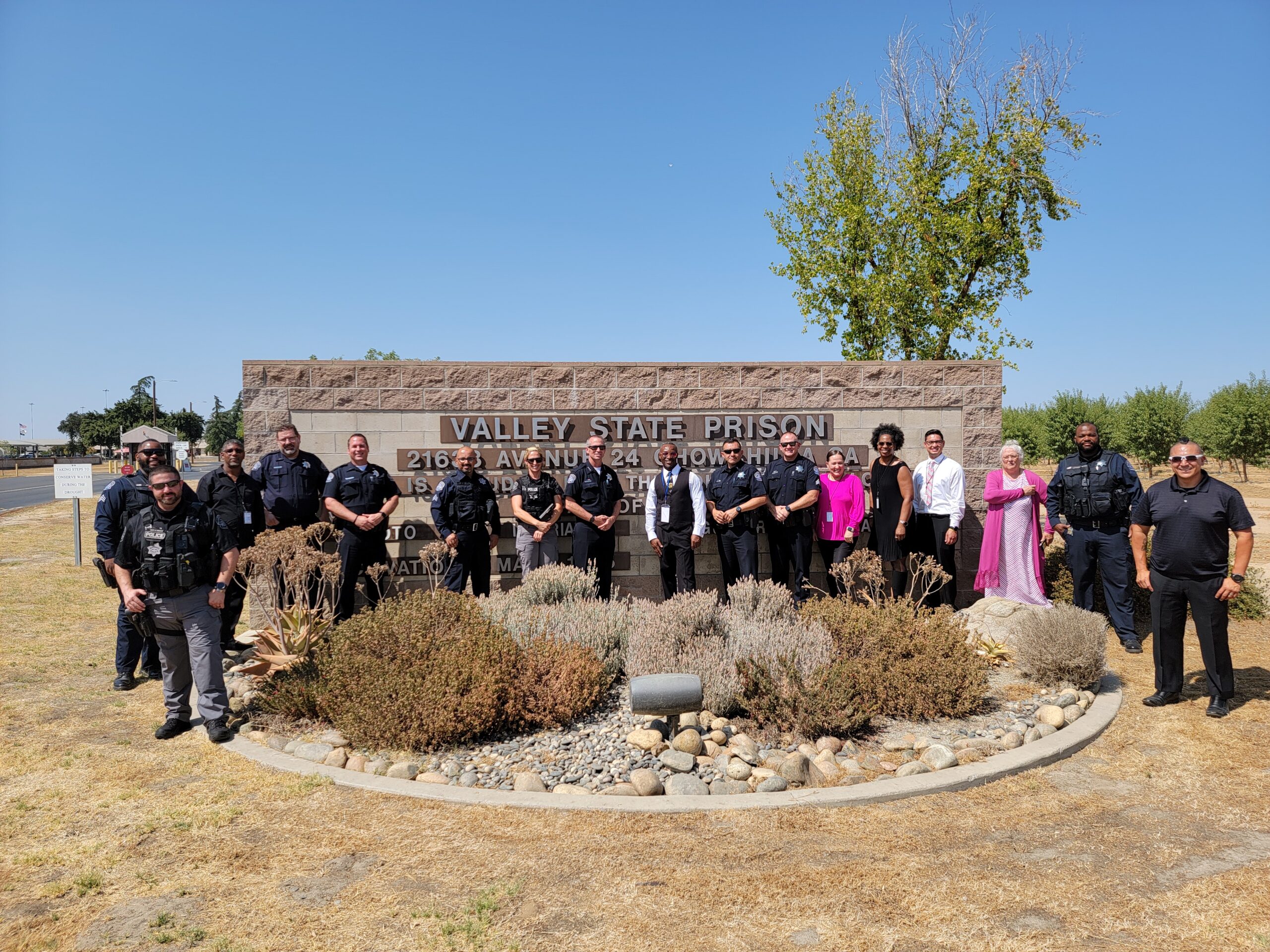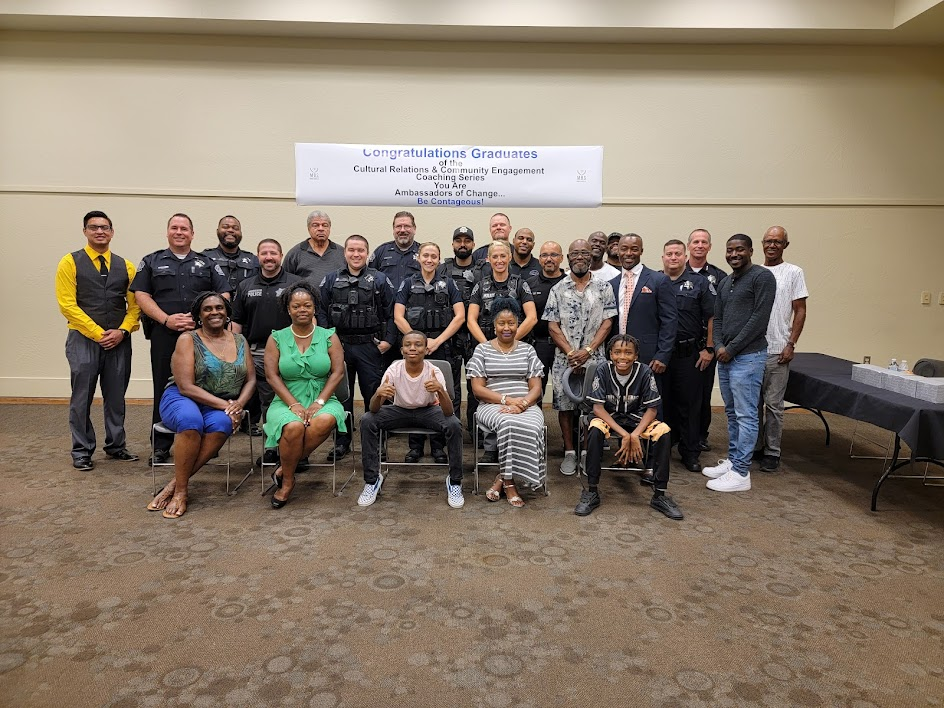
In the late 1980s, I worked in the mayor’s office in Houston, Texas. One of my colleagues was a police officer named Alan who worked on the mayor’s security detail.
Alan and I occasionally worked together on events or projects, and in listening to him over numerous lunchtimes, I began to understand the sacrifices police officers make to protect us. Alan was as community-minded as anyone I’ve ever known. He spent weekends volunteering with agencies in the neighborhoods he had patrolled when he was a cop on the beat. He coached a Little League baseball team.
If something needed to be done in the community, Alan was right there to pitch in. He told me that he had joined the police department because he wanted to help people.
I think Alan understood that community had to be at the essence of everything he did as a police officer — that as a representative of law enforcement he couldn’t be separated from the people he served.
To this day, Alan is the only law enforcement officer I have ever personally known. And for Modesto community advocate Michael Baldwin Sr, that broken connection between law enforcement and the rest of us must be repaired.
Mr. Baldwin has lived in Modesto for less than three years, and he is passionate about imparting to his new community one of the greatest lessons he learned during his time in prison: that connection is everything, and without it, we are all lost.
“Technology is a wonderful thing, he recently remarked. “But I think we’ve lost a lot of that person-to person communication and bonding that allows us to see each other as human beings. We’ve lost that human contact. We have to be intentional about bringing back real, heart-to-heart communication.”
“The work that I’m doing with law enforcement is really challenging,” Mr. Baldwin continued. “I am grateful that I have a checkered past, and I don’t run from that. We are asking law enforcement officers to make a shift in the way they do things.
I believe that in our city we have an excellent group of human beings – and I emphasize that — human beings — doing an impossible job. They show up quite often on the worst day of our lives and then they have to go home and leave all that behind them, and that’s impossible.

“I believe these men and women are trauma survivors who now need to learn that there’s a broader perspective to every situation. I recently had a conversation with an officer about a fairly well-known video. We each had our position on what we perceived was happening in the situation recorded in that video, but the great thing was that we talked — and listened — long enough to be willing to surrender our positions and see the other side. He shared with me a perspective of a law enforcement officer, and I gave him the perspective of a Black man in the community. Because we were open – which we weren’t at first – we wound up in the same place. We were both right.”
That exchange of ideas that he had with the officer about the video took place at the beginning of a series of workshops that Mr. Baldwin and his associates at MBS Consultants organized and facilitated for the Modesto Police Department and members of the city’s African American community.
In fact, the Cultural Relations and Community Engagement Coaching Series proved to be an extraordinarily productive, even transformative commitment of time for the participants. But, as Mr. Baldwin readily admits, it took a lot of work and many honest conversations to get to that point.
The workshops began on May 13th, less than a year after George Floyd’s murder. His death and those of Stephon Clark, Breonna Taylor and others were frequent topics over the course of the intensive 19 multi-hour sessions. The conversations were often difficult and uncomfortable, but necessary, as the MBS consultants continually challenged participants to see things from a different point of view. Topics included “Unconscious Bias, Sensitivity to Cultural Differences,” and, “How Fear Can Affect Our Decision-Making,” among others.
“The first six sessions, when we were only working with the 16 police officers enrolled in the program, were particularly challenging,” relates Mr. Baldwin.
“These where no ordinary officers; there were six sergeants, three lieutenants, an investigator, and six officers, each of whom are leaders in their own right and responsible for the security of the city. And they were questioning me about the crimes I had committed and how I had the right to lead them in this workshop. But we talked through their concerns and began to build relationships. Slowly, perceptions were being expanded and in some cases destroyed. We built up a lot of mutual trust during those conversations.”
By the time the invited members of the African American community joined in, the stage was set for real communication, for skepticism to give way to dialogue.
Employing a number of strategies and techniques including role-playing and situational simulation, Mr. Baldwin and the MBS Consultants team created a safe space where the police officers and members of the community had ample time to speak and, more importantly, to listen to each other. Community members went on ride-along patrols in squad cars to witness that experience. They also went through stages of simulation training to test their reaction to situations officers face daily. Many of the police officers, in turn, participated in community events and visited incarcerated individuals at Valley State Prison and later shared how they gained insight into the difficult life situations that often played a part in their succumbing to crime.
It soon became apparent to all the participants that real progress was being made, that barriers were being torn down. Sergeant Frank Inacio smiled when he related what had happened to him and his colleagues the week before on a dead end street at Colorado and Roselawn.
“Last week I saw a group of kids playing basketball, and I told everyone in my unit to come over to this location, and they played a game of basketball with these kids. One of the parents came up to me and said in awe, ‘I’ve never seen this before!’ We’re out here playing ball with uniforms on, so some of the things we’ve learned in this class are making an impact already. “
“I realized coming in that this workshop was going to be productive, that it was something that needed to be done,” remarked Michael Taylor, a Medical Social Worker.
“We are going through a pandemic where people were sitting on line and having discussions behind computers. So having in-person face-face conversations on these important topics was something that was necessary. For me, I was willing to engage in authentic dialogue. I feel like that was done, I feel like people are putting their chips on the table and having real conversations. Originally, there was skepticism from everyone, not knowing how this was going to work. But over time, people just realized that there’s more that connects us than separates us.”

“I think it’s been helpful just to hear different perspectives and actually just have the time to do it,” Officer Jessica Davies noted. “You don’t get that time in law enforcement because there are other things going on. But the time has been worth it. I’ve definitely made connections and exchanged phone numbers with a couple of the community members and told them that they can call me day or night.”
“I learned a lot about myself, my peers, and the police officers, said Austin Grant, who works for the State of California.
“The program taught me how to have more compassion for others. We all have stories, but listening to what some of the peers went through gave me clarity and reasoning as to why some feel the way they do about law enforcement. I myself can attest that I did not like law enforcement before I entered the coaching series. But once we met the officers participating in the workshops, they all wanted to change the narrative that law enforcement is in it for themselves and not for the citizens they are governed to protect. The Modesto Police Department wants to change the way our citizens see them and bring back heroism to the job.
“The exercise that stood out to me the most was when law enforcement had me and another classmate participate in a simulation,” Mr. Grant explained. “My classmate and I were armed with a fake pistol and Taser for the simulation. We received a call about an argument that was taking place in a home between a married couple. We were instructed to deescalate the situation by using tactics we had been taught by law enforcement. I had my mind made up before approaching the situation that I would not withdraw my pistol and use my Taser if necessary. When we approached the home and witnessed the couple arguing, a mother was nearby, pushing a stroller with her infant inside of it. As the couple argued, the wife suddenly took out a pistol. My classmate and I tried to authorize the wife to drop her weapon but within 20 seconds she had fired the gun, hitting the baby. My classmate and I were shocked and could not believe the outcome. It left me speechless and cold. That simulation hit home for me on why a police officer’s job is so difficult. That truly opened my mind on how we can improve our living conditions in our city and beyond.”
Longtime Modesto resident Kim Wright spoke to what she felt was one of the greatest insights she took away from the workshops:
“When I’m driving by a police car now I look because I want to see who is driving. Do I know them?” Ms. Wright explained. “I do not see them as officers now. I see them as human beings. I see them as part of my community, my social network. Policing is what they do, it’s not who they are. Who they are is a mother, a father, a brother, the volunteer dad down at the YMCA. In the end, we gotta have love. I love these people.”
Each of the participants remembers a moment that was particularly impactful for them.

For Mr. Taylor, it was, “Seeing the younger officers engage. At the beginning of the program you’d see the older officers speaking a lot, but as we moved along the younger officers who had been typically quiet were engaging more, addressing questions that were a little hard to answer, where you didn’t want to put your feelings or opinions out there. But once people felt comfortable, we could have those conversations, and work through them.”
“This workshop will continue to have an impact on me,” reflected Sergeant Robert Gumm.
“It has taught me that people just want to have a voice, and if you hear people out a lot of problems can be resolved. The workshop makes you slow down and think. I’ve always thought I had empathy toward people – I worked our homicide unit for eight years and that taught me empathy for the family members who had lost a loved one – but this program has made me realize that I need to have empathy for everyone out there, even for someone at a simple traffic stop.”
“I hope this was not just a one-hit wonder,” stated Mr. Grant.
“There is a momentum that has built from these classes and they need to be heard around the state. Imagine the impact this could have on our cities. Law enforcement and community members can all break bread and dialogue about certain situations that take place in our communities. We could change the course of history.”
“I am so proud of what all the participants were able to accomplish over the two and a half months of these workshops,” Mr. Baldwin said. “The work they were doing was hard but vitally important. I would go so far as to say that lives could well have been saved because people took the time to listen and learn from each other.”
Mr. Baldwin and his energetic team at MBS Consultants are already laying the groundwork for additional workshops with the Modesto Police Department as well as other entities, and the project will be expanded to include all ethnicities. Mr. Baldwin’s vision, dedication, and work ethic are highly impressive – and the Valley and its residents are the lucky beneficiaries.

VITALLY UPLIFTING, to say the least…
Thank you, Michael Baldwin Senior, of MBS Consultants, AND, all of the HUMAN BEINGS willing to have a part in these vital, getting to know and understand one another, workshops.
The bottom line is that WE ALL ARE HUMAN BEINGS, may noone doubt.
Personally, I have always viewed Police Officers as HEROIC. These men and women, each and every, day and night, face up to the DANGERS that exist (for many diverse reasons), REGARDLESS OF BEING APPRECIATED or not. They are certainly not fainthearted. I appreciate them for taking such a huge part towards keeping us safe, even while they undergo many critisisms for the actions of others and perhaps for some of their own…
Unfortunately, they know from experience OR training, WHAT CAN go wrong once a weapon, or, seeming weapon, enters into the equation. As Austin Grant pointed out, approximately 20 seconds of appealing to an emotional HUMAN BEING, seemingly the HUMANE thing to do, turned out to be the wrong choice, in a particular simulated event.
I sincerely hope that police officers everywhere are trained to act according to statistical outcomes of prior incidents that have gone down negatively, after a single flinch…as well as from positive outcomes that occured. One problem is, perhaps, a lack of consistent, timely, on-going training. Repetition, the mother of retention. Other problems, likely, are the sheer abundance of stress-related activity, burn-out, and a job that, far too often, has limited staffing. These women and men are, after all, only HUMAN BEINGS, not super-heros. Do we hold them up with prayer?
We HUMAN BEINGS have MUCH to learn from EACH OTHER. About myriads of subjects. Open dialog, and earnest attempts to HEAR, the other(s), is ABSOLUTELY what has been missing, long before COVID-19.
It would be valuable education if everyday citizens were to learn how they should respond when the police are on the scene, what we may think are harmless movements may jeopardize our well-being. Attempt to see things through the perspective of police officers. They are on alert for the slightest adversarial motion, indicating someone, including self, IS IN a life-threatening moment. Remember, they have only moments to act.
I knew, we, VALLEY CITIZENS would be hearing MUCH POSITIVE NEWS about Michael Baldwin Senior’s endeavors. He does not disappoint!
Thank you, Tom Portwood, for sharing such ENCOURAGING NEWS…
Again, much GRATITUDE to Eric Cain for his keeping us in the know…
The majority of citizens have great respect and admiration for the police officers that serve the community. It is the politicians and internet that have magnified the size of problems to the point that causes people to lose faith. Considering the number of interactions between police and public, the actual number of problems is relatively low.
I support setting up the police review committee to improve public confidence among those who seem to have lost it because of trolls undermining confidence in our institutions.
I have met many police officers and they are the finest people I have met.
Awesome story I’m so proud of the work my brother is doing.
This sounds like a great program and I would like to attend some classes.